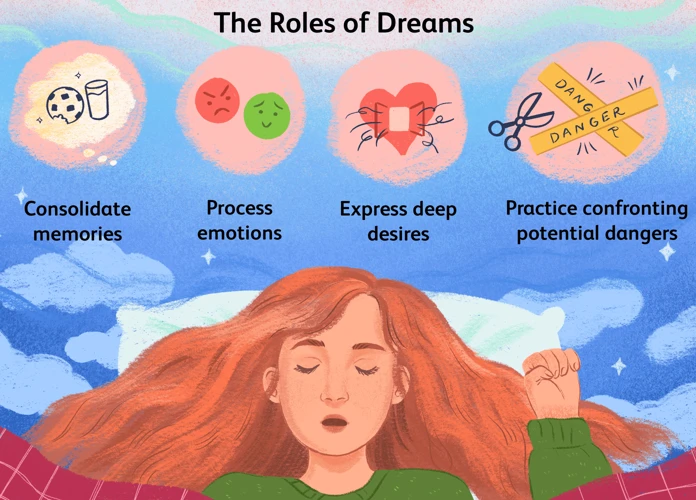Have you ever woken up in a panic after dreaming about falling? It’s a common experience that many people have had, and it leaves us wondering: what does it all mean? Dreams are a mysterious realm of our subconscious, filled with symbols and messages from our inner selves. In this article, we will delve into the fascinating world of dream interpretation and explore the reasons why we often dream about falling. We’ll examine different perspectives, from psychology to spirituality, and uncover the possible meanings behind these unsettling dreams. Join us on this journey of discovery as we unravel the secrets of why we dream about falling and the insights they can offer into our waking lives.
Understanding Dreams

Dreams have long fascinated and perplexed humankind. They serve as a window into the depths of our subconscious, offering insights and intriguing messages. Understanding dreams is no easy task, as they can be influenced by various factors including our thoughts, emotions, and experiences. Scholars and experts have developed different theories and approaches to deciphering dream symbolism and meanings. Some believe that dreams serve a purpose in processing emotions or problem-solving, while others interpret dreams as messages from the spiritual realm. Exploring the significance of dreams requires an open mind and willingness to delve into the realm of the unknown. So, let us embark on this journey of unraveling the mysteries of dreams and discovering the hidden meanings they hold.
1.1 The Purpose of Dreams
The purpose of dreams is a topic that has fascinated philosophers, psychologists, and mystics throughout history. There are several theories regarding the purpose of dreams, each offering a unique perspective on their significance. Sigmund Freud, the renowned psychoanalyst, proposed that dreams serve as a window into our unconscious desires and repressed thoughts. According to Freud, dreams are a way for our mind to fulfill these hidden wishes in a symbolic form. On the other hand, Carl Jung, a Swiss psychiatrist and founder of analytical psychology, believed that dreams are a means of communication between our conscious and unconscious selves. Jung viewed dreams as a powerful tool for self-discovery and personal growth. Whether dreams serve as a mirror of our innermost desires or a pathway to self-understanding, their purpose remains a captivating mystery to explore further.
1.2 Common Dream Interpretation Approaches
Common Dream Interpretation Approaches vary widely, reflecting different perspectives and beliefs about the nature of dreams. One approach is psychological interpretation, which focuses on exploring the subconscious mind and the meanings behind dream symbols. Psychologists may analyze dreams based on personal experiences, emotions, and unresolved conflicts. Another approach is the spiritual interpretation, which views dreams as messages from a higher power or the spiritual realm. These interpretations often involve symbols, archetypes, and spiritual guidance. Additionally, some individuals may apply personal experiences and trauma to interpret their dreams. By drawing connections between their past and the symbols in their dreams, individuals can gain insights into their emotional and psychological well-being. While there are various approaches to interpreting dreams, they all contribute to our understanding of the rich and complex world of dreams.
Dreams about Falling

Dreams about falling are incredibly common and can leave us feeling shaken and unsettled upon waking. Dreaming about falling can have various interpretations depending on the context and individual experiences. From a psychological perspective, these dreams often symbolize a loss of control or a fear of failure. They may reflect underlying anxieties and insecurities about taking risks or feeling overwhelmed in certain aspects of life. On a spiritual and symbolic level, falling dreams could signify a need for surrender and trust in the divine or a reminder to let go of control and go with the flow of life. Personal experiences and trauma can also influence the meaning of falling dreams, such as past incidents involving falls or a sense of instability in one’s life. Exploring the different layers of interpretation can provide valuable insights into the messages these dreams are attempting to convey.
2.1 Psychological Perspective
In the realm of dream interpretation, the psychological perspective offers valuable insights into the meaning behind dreams about falling. From a psychological standpoint, falling dreams can stem from feelings of insecurity, vulnerability, or a fear of failure in waking life. These dreams may indicate a lack of control or a sense of powerlessness in certain situations. They could also be symbolic of anxieties and uncertainties that we may be facing in our daily lives. Exploring the psychological perspective allows us to delve deeper into our subconscious and uncover the underlying emotions and fears that may be manifesting in our dreams. Understanding these psychological aspects can provide us with an opportunity for self-reflection and personal growth. (source)
2.2 Spiritual and Symbolic Interpretation
In the realm of dream interpretation, spiritual and symbolic interpretation offers a unique perspective on dreams about falling. According to this approach, dreams are seen as messages from a higher power or the universe itself. When we dream about falling, it is believed to represent a spiritual descent or a loss of control in our waking lives. This interpretation suggests that these dreams serve as a wake-up call, urging us to examine our life path and make necessary changes to regain a sense of stability and balance. By exploring the spiritual and symbolic aspects of falling dreams, we can gain a deeper understanding of our inner selves and the spiritual guidance that may be influencing our subconscious mind. For more information on dream interpretation, you can check out our article on how to make someone dream about you.
2.3 Personal Experiences and Trauma
Dreams about falling can also be influenced by personal experiences and trauma. When we go through challenging or traumatic events in our lives, they can leave a lasting impact on our subconscious mind. Personal experiences and trauma can manifest in our dreams, including the sensation of falling. These dreams may be symbolic of the feelings of vulnerability, loss of control, or instability that we experienced during those difficult times. Our subconscious mind uses the symbolism of falling to process and explore these emotions, allowing us to confront and heal from our past experiences. It is essential to remember that dream interpretation is highly subjective, and the meaning of falling dreams can differ from person to person based on their unique experiences and individual context. To gain a deeper understanding of the symbolism in your dreams, it may be helpful to seek the guidance of a therapist or professional who specializes in dream analysis.
Meaning of Waking Up from Falling Dreams

Waking up from a dream about falling can evoke a range of emotions, from relief to curiosity about its meaning. The meaning of waking up from falling dreams can shed light on aspects of our lives and subconscious that we may need to explore further. One interpretation suggests that regaining control and overcoming obstacles is a key theme in these dreams. Falling often symbolizes a loss of control or a fear of failure, and waking up signifies our ability to regain control and face challenges head-on. Another perspective suggests that the dream may reflect a deep-seated need for security and stability in our waking lives. The sudden jolt of waking up from a falling dream may indicate a yearning for a sense of safety and reassurance. While these interpretations may vary from person to person, they provide a starting point to explore the underlying emotions and desires that contribute to these vivid dreams. If you’d like to explore more about “cheating in dreams,” you can read our article on dreams about cheating and regretting it.
3.1 Regaining Control and Overcoming Obstacles
Dreams about falling and waking up can often be interpreted as representing a need to regain control and overcome obstacles in our waking lives. Regaining control and overcoming obstacles is a theme that resonates with many individuals who experience falling dreams. These dreams may reflect a sense of powerlessness or a fear of losing control in certain situations. They serve as a reminder to face our fears and take charge of our lives. Falling dreams can symbolize the challenges and obstacles we encounter, urging us to find the strength and resilience to overcome them. By confronting these obstacles head-on, we can regain a sense of control and successfully navigate the ups and downs of life’s journey. It is important to interpret falling dreams as a call to action rather than a representation of failure or instability.
3.2 The Need for Security and Stability
Dreams about falling and waking up can also point to a deeper psychological need for security and stability. When we experience dreams of falling, it often triggers feelings of fear and a loss of control. This can be symbolic of our subconscious desire for a stable and secure environment in our waking life. These dreams may reflect underlying anxieties or uncertainties that we may be facing, such as changes in our personal or professional life. The sensation of falling in dreams can serve as a metaphor for our fear of losing our footing or the stability that we have built. It is important to pay attention to these dreams as they may be urging us to seek more stability and security in our waking life, whether it’s through creating a stronger support system, establishing healthy boundaries, or taking practical steps to enhance our overall well-being.
Exploring Dream Symbols
Dreams are a kaleidoscope of symbols, each holding a unique significance and meaning. When exploring dream symbols, we uncover hidden messages and insights from our subconscious mind. One common symbol in dreams is heights, which often represents a fear of failure or a sense of insecurity. Another symbol is the loss of control, which can indicate a feeling of powerlessness in waking life. Anxiety and instability are also frequently recurring symbols in dreams, reflecting the uncertainties and challenges we face. By delving into the depths of these symbols, we begin to unravel the intricate tapestry of our dreams and gain a deeper understanding of ourselves and our waking experiences. So, let us embark on this journey of exploration as we decipher the enigmatic world of dream symbols and unlock the secrets they hold.
4.1 Heights and Fear of Failure
Within the realm of dream symbolism, heights often represent the fear of failure. When we dream about falling from great heights, it can indicate deep-seated insecurities and anxieties about not living up to expectations or falling short in some aspect of our lives. This dream symbol may suggest that we are grappling with self-doubt and a fear of taking risks. The feeling of being on top of a tall building or cliff-edge magnifies these emotions, intensifying our fear of failure. It serves as a reminder that we need to confront our insecurities and build confidence to overcome the challenges that lie ahead. By facing our fears head-on, we can break free from the cycle of doubt and achieve our goals.
4.2 Loss of Control and Powerlessness
Loss of control and powerlessness are common themes in dreams about falling. These dreams often reflect our subconscious fears and anxieties related to situations where we feel helpless or out of control in our waking lives. When we dream about falling and experience a loss of control, it can point to feelings of powerlessness in certain aspects of our lives. It may indicate a lack of control over our relationships, work, or personal situations. This dream symbol can be a reminder to examine areas in our lives where we may be feeling overwhelmed or lacking authority. It serves as a subconscious prompt to regain control and take proactive steps towards reclaiming our power. Whether it’s seeking support from others, setting boundaries, or making necessary changes, acknowledging these dreams can offer valuable insights and guidance for empowering ourselves in our waking lives.
4.3 Instability and Anxiety
Dreams that involve a sense of instability and anxiety can reveal underlying fears and uncertainties in our waking lives. When we dream about instability, it may symbolize a lack of control or a fear of unpredictable situations. These dreams often reflect our anxieties about the future and our ability to navigate through challenging circumstances. We may find ourselves in situations where we are constantly on edge, feeling overwhelmed by the uncertainty of the outcome. The dream serves as a reminder to address these feelings of instability and anxiety in our waking life, allowing us to explore ways to regain a sense of stability and find inner peace amidst the turmoil. By acknowledging and addressing these dreams, we can gain valuable insights into our emotional well-being and take steps towards creating a more stable and secure future.
Conclusion
In conclusion, dreaming about falling is a common experience that can hold significant meanings for individuals. Whether interpreted from a psychological perspective, a spiritual and symbolic lens, or through personal experiences and trauma, these dreams offer insights into our fears, anxieties, and desires for stability and control. Exploring dream symbols, such as heights and the fear of failure, loss of control and powerlessness, and feelings of instability and anxiety, allows us to gain a deeper understanding of ourselves and our waking lives. Remember, dream interpretation is a personal and subjective endeavor, and it is important to trust your own intuition and insights when reflecting on your dreams. Embrace the enigmatic nature of dreams and let them guide you towards self-discovery and personal growth.
Frequently Asked Questions
Why do we have dreams?
Dreams serve a variety of purposes, including processing emotions, consolidating memories, and problem-solving. They provide an outlet for the subconscious mind to express itself and can offer valuable insights into our thoughts, feelings, and experiences.
What is the meaning of dreams?
The meaning of dreams can vary greatly depending on the individual and their unique experiences and emotions. Dreams are highly subjective and symbolic, often reflecting our inner desires, fears, and unresolved conflicts. Exploring dream symbolism can provide a deeper understanding of ourselves and our subconscious thoughts.
Why do we dream about falling?
Dreaming about falling is a common theme that can represent a loss of control, fear of failure, or feelings of instability and anxiety. These dreams may reflect our need for security and stability in various areas of our lives or indicate unresolved trauma or past experiences related to falling.
Are dreams random or meaningful?
While dreams may seem random at times, they often have symbolic meanings and can be interpreted to reveal valuable insights. Dreams are influenced by our conscious and subconscious thoughts, emotions, and experiences, making them a meaningful reflection of our inner selves.
Can dreams predict the future?
While some people claim to have experienced prophetic dreams, the ability of dreams to predict the future remains uncertain. Dreams are generally more focused on representing our present thoughts and emotions rather than providing accurate predictions. However, they can offer guidance and insights into our current circumstances.
Why do we sometimes wake up from dreams?
Waking up from dreams can be caused by various factors, such as intense emotions, disturbances in the external environment, or shifts in our sleep cycles. Sometimes, waking up from a dream can be a result of the dream becoming too vivid or disturbing, causing the mind to break out of the dream state.
Can dreams be controlled?
Lucid dreaming is a phenomenon where an individual becomes aware that they are dreaming and can exert some control over the dream’s content. With practice and techniques like reality checks and dream journaling, some people can learn to have lucid dreams and actively influence their dream experiences.
Is there a universal interpretation for dream symbols?
Dream symbols are highly personal and subjective, making it challenging to establish universal interpretations. While some symbols may have shared meanings across cultures and societies, it’s important to consider an individual’s unique experiences, emotions, and context when interpreting dream symbols.
Why do dreams often feel so real?
Dreams can feel incredibly real due to the activation of the brain’s sensory areas during REM (rapid eye movement) sleep, the sleep stage associated with vivid dreaming. The brain creates detailed environments, emotions, and sensations, leading to a convincing and immersive dream experience.
Can certain medications or substances affect dreams?
Yes, certain medications, substances, and even environmental factors can have an impact on the content and intensity of dreams. Some medications may influence sleep patterns or dream recall, while substances like alcohol or recreational drugs can alter the content and vividness of dreams.







